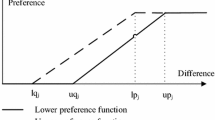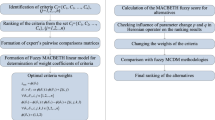Abstract
A method to assess material recyclability using fuzzy logic is presented. Recyclability of materials is defined as a function of several variables, called basic indicators, which influence the technology and economics of the recycling processes, policies related to recycling, quality of recycled materials, and environmental impact of waste. Using a hierarchical network of fuzzy inference engines, the basic indicators are aggregated into more composite components of recyclability from which an overall recyclability measure is computed. A sensitivity analysis with respect to indicators identifies those components affecting the overall recyclability the most. Recyclabilities of three metals and three non-metals of high economic and industrial importance are assessed using this method.
Similar content being viewed by others
References
Ayres, R.U.: Metals recycling: economic and environmental implications. Resour. Conserv. Recycl. 21(3), 145–173 (1997)
Ayres, R.U., Ayres, L.W., Råde, I.: The life cycle of copper, its co-products and by-products. World Business Council for Sustainable Development (2002)
Craig, P.P.: Energy limits on recycling. Ecol. Econ. 36(3), 373–384 (2001)
Craighill, A.L., Powell, J.C.: Lifecycle assessment and economic evaluation of recycling: a case study. Resour. Conserv. Recycl. 17(2), 75–96 (1996)
Douglass, C.: Government’s hand in the recycling market: a new decade. Policy study no. 148, Center for the Study of American Business, Washington University (1998). http://csab.wustl.edu
HSE (Health and Safety Executive), Mapping health and safety standards in the UK waste industry. Research Report 240, (2004). http://www.hse.gov.uk/research/rrpdf/rr240.pdf
Krozer, J., Doelman, P.: Policy incentives for waste prevention. An economic approach to design for recycling. J. Sustain. Prod. Des. 3, 3–17 (2003)
Kouikoglou, V.S., Phillis, Y.A.: A monotonic hierarchical fuzzy system with sum-product logic. Working paper (2007)
Kouikoglou, V.S., Phillis, Y.A.: A monotonic fuzzy system for assessing material recyclability. In: Proceedings of the IEEE International Conference on Systems, Man and Cybernetics, pp. 3426–3431, Hawaii, USA, 10–12 October (2005)
Liu, Z.F., Liu, X.P., Wang, S.W., Liu, G.F.: Recycling strategy and a recyclability assessment model based on an artificial neural network. J. Mater. Process. Technol. 129, 500–506 (2002)
McLaren, J., Parkinson, S., Jackson, T.: Modelling material cascades-frameworks for the environmental assessment of recycling systems. Resour. Conserv. Recycl. 31(1), 83–104 (2000)
Sibley, S.F., Butterman, W.C.: Metals recycling in the United States. Resour. Conserv. Recycl. 15(3–4), 259–267 (1995)
Villalba, G., Segarra, M., Fernández, A.I., Chimenos, J.M., Espiell, F.: A proposal for quantifying the recyclability of materials. Resour. Conserv. Recycl. 37(1), 39–53 (2002)
Won, J.M., Park, S.Y., Lee, J.S.: Parameter conditions for monotonic Takagi-Sugeno-Kang fuzzy system. Fuzzy Sets Syst. 132(2), 135–146 (2002)
Author information
Authors and Affiliations
Corresponding author
Rights and permissions
About this article
Cite this article
Phillis, Y.A., Kouikoglou, V.S. & Zhu, X. Fuzzy Assessment of Material Recyclability and Its Applications. J Intell Robot Syst 55, 21–38 (2009). https://doi.org/10.1007/s10846-008-9290-x
Received:
Accepted:
Published:
Issue Date:
DOI: https://doi.org/10.1007/s10846-008-9290-x




